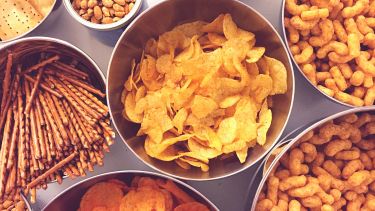- A new study led by the University of Sheffield suggests that treats, such as sweets, chocolate and salty treats, increased for some people during Covid-19 lockdowns.
- People with low control over their cravings were most at risk of increasing their snack intake during the lockdown.
- Researchers warn about weight and health related issues for at-risk adults due to the impact of lockdowns on our eating behaviours
A new study has found people turned to sweets, chocolate and salty snacks during the Covid-19 lockdowns in the UK and Australia.
Psychologists from the University of Sheffield and Flinders University in Australia studied people’s eating habits during lockdown and found that over half of people reported an increase in snacking.
Findings from the study show that people who reported having low control over their cravings were most at risk of eating more calorie laden foods, such as chocolate and crisps, during the pandemic.
The researchers have warned about a rise in weight and related health issues for at-risk adults due to the impact extended lockdowns have had on our eating behaviours.
Stress created by the pandemic appeared to be associated with reported increases in savoury and sweet snack intake.
Dr Nicola Buckland
University of Sheffield's Department of Psychology
“The key finding from this study was that, in terms of dietary changes, not everyone responded the same way to the lockdown. Over half of the respondents (53 per cent) reported increased snack intake, 26 per cent reported decreased snack intake and 20 per cent reported no changes to the amount of snacks they ate during the lockdown.
“When we looked at the participants’ eating styles (based on responses to questionnaires), we found that participants who scored low in the ability to control cravings were more likely to report increased snack intake.”
Participants indicated whether their intake of calorific foods (e.g. chocolate, cakes, ice cream, pizza) had changed during the lockdown. These are foods that people typically report to be difficult to resist and difficult to control intake of. Participants also completed questionnaires that measure individual eating styles.
Professor Eva Kemp, from Flinders University, studied the same behaviours in Australia.
Similar to the UK findings, of the Australian respondents, 49 per cent reported increased snack intake during the Covid-19, and the remaining respondents reported either reduced snack intake (25 per cent) or no change (26 per cent).
Professor Kemp, said: “Increased snack intake was associated with higher levels of perceived stress, indicating that those who experienced higher levels of stress reported greater increases of sweet and savoury snack foods.
“Also, similar to the UK survey, participants with low craving control were most likely to report increased snack intake.”
The findings from the UK and Australian surveys show that for some people, especially those who have difficulty controlling food cravings, the Covid-19 lockdowns were a challenging time period for increased food intake.
The researchers advised that “Our findings support the use of strategies that can help people to manage their cravings, to minimise the risk of increased snack intake during the COVID-19 lockdowns.”
Additional information
The University of Sheffield's Department of Psychology
Contact
For more information please contact:

